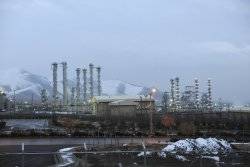The US White House has raised concerns about a recent report that Iran and Russia are negotiating an oil-for-goods swap worth $1.5bn a month, a deal a spokeswoman said could trigger US sanctions.
Such a deal would significantly boost Iran's oil exports, which have been slashed by more than half to about 1 million barrels a day by US and European sanctions aimed at forcing Iran to accept curbs to its nuclear programme.
Russian and Iranian sources close to the barter negotiations said the deal could see Russia buy as much as 500,000 barrels a day of Iranian oil in exchange for Russian equipment and goods.
"We are concerned about these reports and Secretary (of State John) Kerry directly expressed this concern with (Russian) Foreign Minister (Sergei) Lavrov today," Caitlin Hayden, spokeswoman for the White House National Security Council, told Reuters agency on Monday.
Iran's foreign minister said his country had similar concerns over the deal. "There is a very serious confidence deficit vis-à-vis the West in Iran," Mohammad Javad Zarif said. "Our people believe that our peaceful nuclear programme has been dealt with in a totally unfounded way. The Iranian people have been subjected to various pressures that have run counter to international law."
Reza Marashi, Research Director at the National Iranian Council and former US State department official, told Al Jazeera he understands the US concerns.
"I think there is concern on the part of the United States because right now we feel we have Iran in a good place; meaning that were are in the diplomatic process in an effort to try and get a larger deal, a final deal, that solves all of the problems and there is concern that we can empower elements inside of Iran that are opposed to diplomacy if we go forward with this deal between Iran and Russia," Marashi said.
Obama urges diplomacy
In Washington, President Obama urged Congress to resist the temptation to approve further economic sanctions against Iran, saying: "Now is the time for us to allow the diplomats and technical experts to do their work."
"What we want to do is give diplomacy a chance and give peace a chance," Obama said after a meeting with Spanish Prime Minister Mariano Rajoy in the Oval Office.
"My preference is for peace and diplomacy ... now is not the time for us to impose new sanctions," Obama said.
Iran agreed on Sunday to limit its enrichment of uranium and allow more international monitoring for six months in exchange for about $7bn in sanctions relief.
The agreement with the P5+1 group of major world powers includes a pause on efforts to further reduce Iran's exports of crude oil – although it does not allow major buyers to increase their imports.
Russia is part of the P5+1 group, but has not been part of the sanctions efforts, led by the US and Europe.
"If the reports are true, such a deal would raise serious concerns as it would be inconsistent with the terms of the P5+1 agreement with Iran and could potentially trigger US sanctions," Hayden said.
Iran and the P5+1 group will likely begin talks on a long-term nuclear deal in February – talks that both Iran and the US have said will be difficult.
PHOTO CAPTION
In this Jan. 15, 2011 file photo, Iran's heavy water nuclear facility near the central city of Arak is back dropped by mountains.
Aljazeera


 Home
Home Discover Islam
Discover Islam Quran Recitations
Quran Recitations Lectures
Lectures
 Fatwa
Fatwa Articles
Articles Fiqh
Fiqh E-Books
E-Books Boys & Girls
Boys & Girls  Ramadan
Ramadan Fatwa Audios
Fatwa Audios Month of Mercy
Month of Mercy Women
Women Eed Al- Fitr
Eed Al- Fitr Food Recipes
Food Recipes Videos
Videos

 Prayer Times
Prayer Times












